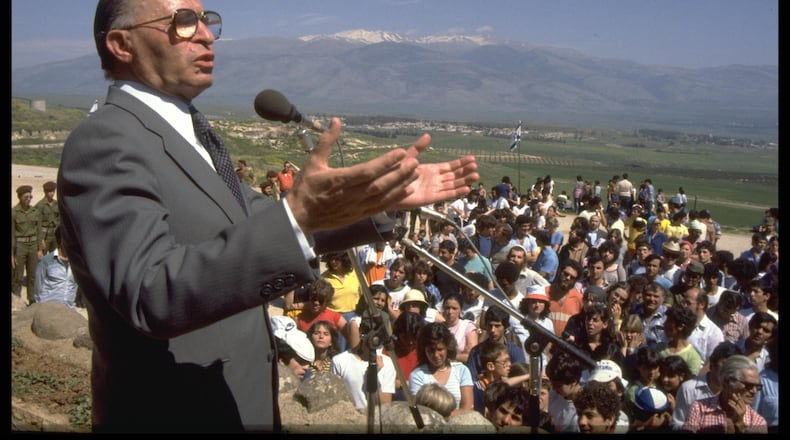A man who survived unimaginable hardships including imprisonment in a Soviet gulag and the Holocaust that killed his parents and brother, Menachem Begin went on to become Israel’s sixth prime minister and a passionate advocate for social justice.
Begin is the subject of a new documentary “Upheaval: The Journey of Menachem Begin,” which charts Begin’s private and political life and his often complicated, controversial embrace of both conflict and peace. The film is directed by award-winning Maryland-based filmmaker Jonathan Gruber and screens at this year’s Atlanta Jewish Film Festival.
“The dichotomy of Begin’s toughness and determination with his very gentle side came from the same place,” says Gruber of his subject, “his passion for defending the dignity of his people.”
“Begin’s traumatic early years steeled him for the challenges of leadership,” says Gruber. “Every decision he made as prime minister was viewed through the lens of the six million lives lost in the Holocaust, defending the dignity of the Jewish people, and building a self-reliant country as a haven for those in distress,” says Gruber.
“Upheaval,” chronicles Begin’s origins in Belarus and early activism in a youth group that used self-defense to counter anti-Semitism at his university.
It was an early indication of the grit and fighting spirit of a man who would go on to lead violent uprisings against the British for control of Palestine in the years following World War II. The ouster of the British ultimately paved the way for the 1948 formation of the Jewish state of Israel. Committed to offering Israel as a refuge, as Prime Minister from 1977 to 1983, Begin welcomed Ethiopian Jews and persecuted Russian Jews. That embrace of the oppressed extended to non-Jews too, like the Vietnamese boat people fleeing the Communist takeover of their country to who he offered safe harbor in Israel.
Credit: MILNER MOSHE/Israeli Government Press Office
Credit: MILNER MOSHE/Israeli Government Press Office
But Begin may be best remembered for his role as a peacemaker. In 1977 Begin met with Egyptian President Anwar Sadat at Camp David for grueling 13-day long peace negotiations facilitated by President Jimmy Carter. Begin and Sadat hammered out the details of what would become a historic 1979 peace treaty between Israel and Egypt.
Credit: SA'AR YA'ACOV/Israeli Government Press Office
Credit: SA'AR YA'ACOV/Israeli Government Press Office
One former Atlantan who had a front-row seat to those peace negotiations as President Carter’s Chief Domestic Policy Advisor is Stuart Eizenstat, who met with Begin several times at the White House and is featured in “Upheaval.”
Credit: RICK MCKAY
Credit: RICK MCKAY
Eizenstat grew up in Morningside and graduated from Grady High School where he was an all-City and Honorable Mention All-American in basketball.
Following the Carter years, Eizenstat went on to serve in a number of distinguished positions, among them United States Ambassador to the European Union and Deputy Secretary of the Treasury under President Bill Clinton. He now heads Washington, DC law firm Covington & Burling’s international practice.
A frequent visitor to Atlanta where he still has family, Eizenstat continues to give back to the city where he grew up. He is the sponsor of the annual Fran Eizenstat and Eizenstat Memorial Lecture at the Ahavath Achim Synagogue in Atlanta (which he attended in his youth and where he had his bar mitzvah). Over its 32-year history, the lecture series has featured prominent speakers including Joe Biden, Jimmy Carter, Henry Kissinger, Madeleine Albright and Ruth Bader Ginsburg.
Credit: File
Credit: File
Eizenstat remembers Begin as a man who was “a tough negotiator who was slow to compromise, kept his ultimate positions to himself, and knew how to wring out concessions from both Egypt and the US before he compromised himself.”
“He was a difficult negotiating partner, but he was honest and had a great degree of integrity,” notes Eizenstat.
“He was a very proud, erudite person with a great sense of Israeli, Jewish, American and world history. He spontaneously delivered Lincoln’s Gettysburg address when President Carter took him and Sadat to the Gettysburg battlefield. He was not a man for small talk or jokes except with his most intimate friends,” recalls Eizenstat.
Credit: Handout
Credit: Handout
“He always seemed to me to bear the burdens of the Jewish people on his shoulders,” says Eizenstat.
“He could be emotional. For example, I recommended to President Carter (along with White House Counsel Bob Lipshutz) that he create a Presidential Commission on the Holocaust chaired by Elie Wiesel (who led directly to the United States Holocaust Memorial Museum). We decided to announce it during a visit to the White House by Prime Minister Begin, knowing how much the Holocaust impacted his family. He was openly moved and touched.”
Credit: Handout
Credit: Handout
“He exemplified the values of inclusivity, social justice, unity and compromise,” says director Gruber.
“We don’t see this in enough leaders.”
EVENT PREVIEW
“Upheaval: The Journey of Menachem Begin”
Available for viewing in the Atlanta Jewish Film Festival’s Virtual Cinema.
Noon on Feb. 23 to noon on Feb. 26. $16. One ticket allows for one view of the film per household. ajff.org/film/upheaval.
About the Author
The Latest
Featured








